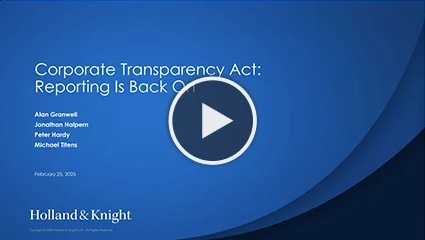Avoiding or Rolling Over Required Minimum Distributions Already Taken in 2020

To prevent individuals from being forced to liquidate assets in their retirement accounts at greatly reduced values to fund a Required Minimum Distribution (RMD), the Coronavirus Aid, Relief, and Economic Security (CARES) Act allows individuals to waive such RMDs from their individual retirement accounts (IRAs) and/or their 401(k), 403(b) or 457(b) accounts during 2020. Furthermore, if an individual has already taken their RMD for tax year 2020, they may be able to roll their RMD back into an IRA (or company plan) and avoid paying income tax on this distribution for tax year 2020.
Direct Rollovers
Traditionally, the most straightforward way to accomplish an IRA rollover is though a trustee-to-trustee transfer. Under this method, also known as a direct rollover, the financial institution holding a taxpayer's IRA makes a payment from the IRA to another IRA or to a retirement plan. There are no limits on the number of direct rollovers that may be executed by a taxpayer in a particular time period. However, once a distribution has been made to a taxpayer, a distribution can no longer be rolled over to another IRA in a trustee-to-trustee transfer.
Indirect Rollovers
Alternatively, an indirect rollover can be accomplished when a taxpayer deposits the retirement distribution into the same or different retirement account within 60 calendar days from the day they received the distribution. Although RMDs are not eligible to be rolled over, any distribution from an IRA and/or 401(k), 403(b) or 457(b) accounts during 2020 will not be considered a RMD and thus would be eligible to be indirectly rolled over. It is important to note that only one retirement distribution can be deposited back into an IRA by a taxpayer within a 12-month period. If a taxpayer receives their RMD in monthly distributions, only one monthly distribution would be able to be rolled back into an IRA. Additionally, in order for the retirement distribution to be considered entirely nontaxable, the full amount of the distribution, including the amounts withheld for federal and state income tax purposes, must be deposited back into a retirement account. Since a taxpayer will not have access to the funds that were withheld for tax purposes, additional funds would have to be accessed to ensure the entire distribution is treated as nontaxable. Even if an indirect rollover is made, the 1099-R issued from the financial institution will not take the indirect rollover into consideration for reporting purposes, so the taxpayer should notify their tax preparer the amount that was rolled over.
Inherited IRAs
Inherited IRAs are included as being exempt from RMDs during 2020. However, although inherited IRAs are eligible for trustee-to-trustee transfers, a distribution received from a non-spousal inherited IRA cannot be indirectly rolled over into an IRA or another retirement plan within 60 calendar days. As such, any distribution already received from a non-spousal inherited IRA will be taxable in 2020.
Roth Conversion
Another possible strategy for an RMD already received in 2020 is to roll over the RMD into a Roth IRA, a strategy known as a Roth Conversion. Unlike direct contributions to a Roth IRA, a taxpayer may complete a Roth Conversion regardless of their modified adjusted gross income. Although a Roth Conversion will cause the distribution to be taxable for tax year 2020, the amount rolled over will be able to grow tax-free in a Roth IRA without being subject to any RMDs in future tax years. After a five-year period has elapsed from the first day of the tax year in which the conversion was made, both the principal and the earnings may be withdrawn from the Roth IRA tax-free (prior to the end of the five-year period, only the principal of the Roth IRA may be withdrawn tax-free). Since this type of Roth Conversion would be considered an indirect rollover, the 2020 distribution must be deposited into the Roth IRA within 60 calendar days of when the taxpayer received the distribution.
For questions regarding the CARES Act and how these changes can affect you and your family's financial situation, please contact a member of Holland & Knight's Private Wealth Services Group.
DISCLAIMER: Please note that the situation surrounding COVID-19 is evolving and that the subject matter discussed in these publications may change on a daily basis. Please contact your responsible Holland & Knight lawyer or the author of this alert for timely advice.

